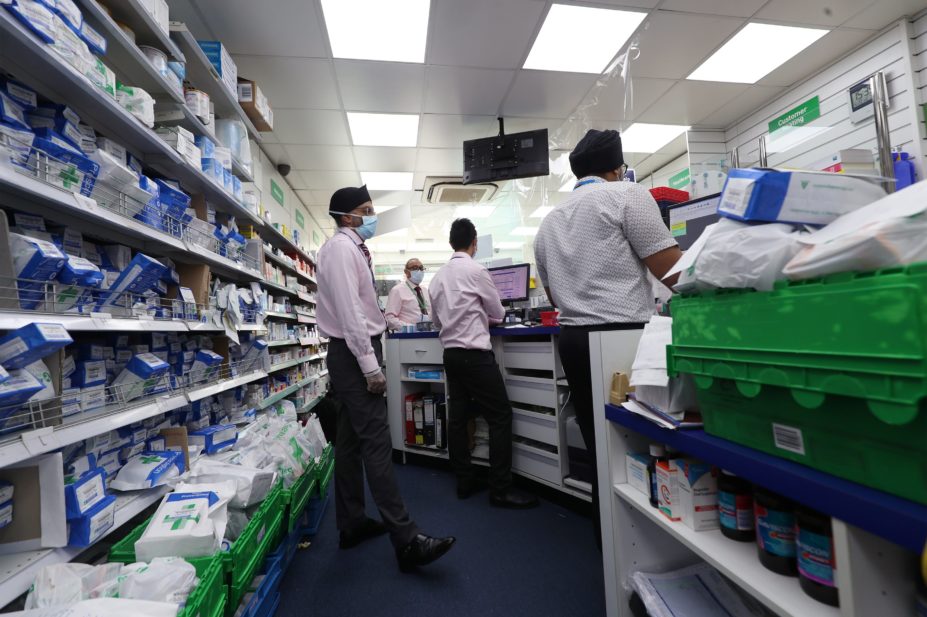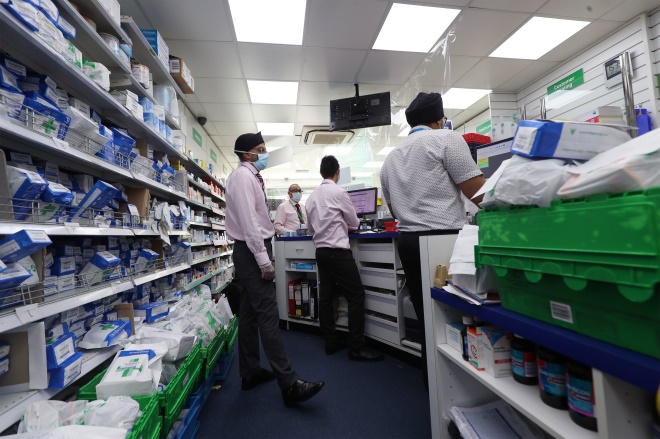
PA Images
Open access article
The Royal Pharmaceutical Society has made this article free to access in order to help healthcare professionals stay informed about an issue of national importance.
To learn more about coronavirus, please visit: https://www.rpharms.com/resources/pharmacy-guides/wuhan-novel-coronavirus

Source: Yui Mok/PA Wire/PA Images
Trade bodies have warned that the £300m government funding advance would not prevent pharmacy closures if it had to be paid back
Community pharmacies need millions of pounds extra “to keep their heads above water” during the COVID-19 pandemic, pharmacy bodies have warned.
Speaking to The Pharmaceutical Journal, Leyla Hannbeck, chief executive of the Association of Independent Multiple Pharmacies, said each pharmacy needed an extra £10,000 in both April and May 2020, in addition to the government’s £300m advance payments, which are due to be paid back.
In March 2020, the Pharmaceutical Service Negotiating Committee (PSNC) announced that it had secured the loan, which was to be paid to pharmacies in two instalments — one payment of £200m at the beginning of April 2020 followed by the remaining £100m in May 2020. The PSNC has now said that it is pressing the government in negotiations to allow pharmacies to keep the advance payments.
Hannbeck said the loan was “welcome”, but “in total was about £200m short”.
“The funding has not reflected on the inflation and costs going up. And with all the extra workload related to the unprecedented situation with COVID-19, many are struggling to keep their heads above the water and desperately need funding,” she said.
Hannbeck added that the funding “needs to be extra, and on a regular basis, to help with the additional costs and cashflow impacts”.
She said the organisation had asked its pharmacy contractors “to send to us the sort of costs that have occurred in March [2020] in relation to COVID-19 alone”, which was then sent to the PSNC to help them calculate how much the sector needed from the government.
Mark Lyonette, chief executive of the National Pharmacy Association (NPA), said his organisation had surveyed members to ascertain the costs associated with the pandemic, adding that the NPA expected “to do another survey of members in May to cover April [2020 costs] and possibly June to cover May [2020]”.
“Some of those costs — like the extra staffing costs, with people being off, security screens, personal protective equipment (PPE) — those are ongoing,” he said. “It’s not as though you can say this is what happened in March [2020] and that’s that. In reality, this is something that will need to be sorted each month.”
Lyonette added that pharmacies will be spending “many, many tens of millions of pounds” each month to stay open, adding that the NPA was worried about pharmacy closures.
“If cashflow was a problem for people — and they were worried about paying their wholesaler bills beforehand — it is only getting worse,” he said. “You just have to hope that the government doesn’t learn that by too many falling over the edge.”
Their comments come after trade bodies — including the Company Chemists’ Association (CCA) — said the £300m loan would not prevent pharmacy closures and would “only just cover half of the estimated uplift in prescription items” in March 2020.
In a statement sent to The Pharmaceutical Journal on 22 April 2020, Malcolm Harrison, chief executive of the CCA, noted that community pharmacies have likely “had to spend many tens of millions of pounds extra in order to keep its doors open”.
“In March, the chancellor of the exchequer committed in parliament that: ‘Whatever extra resources our NHS needs to cope with coronavirus — it will get’,” Harrison said.
“Community pharmacy has been on the frontline for the NHS during the crisis and it needs government support to continue in this vital role.”
The CCA added that the extra funding will be needed to cover the cost of rising medicine prices, which it said is partly owing to patients requesting medicines that they have not used for many years.
With the £800m retained margin agreed upon being based on a forecasted volume of items, the CCA warned that the additional volume could dilute this available funding.
The organisation added that the additional money was needed to cover the costs of PPE, which contractors have had to self-fund owing to shortages, as well as staff overtime, extra cleaning and security.
Pharmacists — who are unable to deliver face-to-face services –— have also lost funding through usual channels, such as the new medicines service and medicines use reviews.
Simon Dukes, chief executive of the PSNC, told The Pharmaceutical Journal that it could not comment on its confidential funding negotiations with the government, but said that the Committee “absolutely agrees that community pharmacy needs additional funding to cover the costs of COVID-19”, as the £300m loan “has not relieved all of the financial pressures that pharmacies are under and many contractors will not be able to afford to pay this back”.
“We are, therefore, pressing for the £300m advance to be reconciled and not repaid to help cover costs associated with increased prescription numbers; extra staff costs from the increased demands for advice and medicines, covering for sickness and the rise in locum rates; and one-off costs, such as decontaminating pharmacies when someone infected had visited,” he said, adding that the PSNC has warned the government “that without additional monies for the sector, the current situation is not sustainable”.
In a letter published on 17 March 2020, NHS England and NHS Improvement committed to reimbursing clinical commissioning groups for NHS urgent medicines supply services and medicines delivery services offered in community pharmacies, as well as reimbursing payments to contractors required to close owing to the pandemic.
The Pharmaceutical Journal has approached the Department of Health and Social Care for comment.


